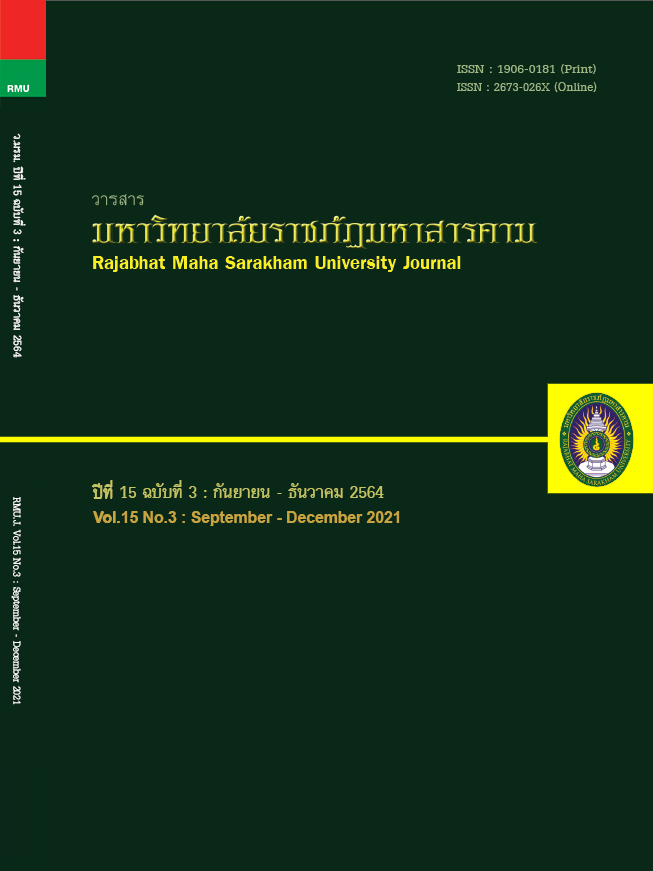ผลของการเสริมไลซีนในอาหารต่อสมรรถนะการผลิตและคุณภาพไข่ของไก่ไข่
Main Article Content
บทคัดย่อ
การศึกษาครั้งนี้ มีวัตถุประสงค์เพื่อศึกษาผลของการเสริมไลซีนในอาหารในระดับต่าง ๆ ต่อสมรรถนะการผลิตและคุณภาพไข่ของไก่ไข่ โดยทดสอบกับไก่ไข่พันธุ์อีซ่าบราวน์ อายุ 50 สัปดาห์ จำนวน 100 ตัว ใช้แผนการทดลองแบบสุ่มสมบูรณ์ แบ่งไก่ไข่ออกเป็น 5 กลุ่ม กลุ่มละ 10 ซ้ำ ซ้ำละ 2 ตัว อาหารทดลองมีโปรตีน 16% มีระดับพลังงานที่ใช้ประโยชน์ได้ 2,900กิโลแคลอรี่ต่อกิโลกรัม และมีระดับการเสริมไลซีนแตกต่างกัน 5 ระดับ คือ 0.80, 0.90, 1.00, 1.10 และ 1.20% ให้ไก่ไข่ได้รับอาหารและน้ำดื่มอย่างเต็มที่ ตลอดเวลา ผลการศึกษา พบว่าไก่ไข่ที่ได้รับอาหารที่มีระดับไลซีนแตกต่างกันทั้ง 5 ระดับ มีสมรรถนะการผลิต คือ ปริมาณอาหารที่กิน อัตราการเปลี่ยนอาหารเป็นไข่ประสิทธิภาพการใช้โปรตีน ผลผลิตไข่ น้ำหนักไข่ และมวลไข่ ใกล้เคียงกัน ไม่มีความแตกต่างทางสถิติ (P>0.05) เช่นเดียวกับคุณภาพไข่ พบว่าไก่ไข่มีคุณภาพไข่ น้ำหนักไข่ขาว น้ำหนักไข่แดง น้ำหนักเปลือกไข่ ค่าฮอฟ์ ยูนิต สีไข่แดง ความแข็งของเปลือกไข่ และความหนาของเปลือกไข่มีค่าใกล้เคียงกัน ไม่มีความแตกต่างทางสถิติ (P>0.05) สรุปได้ว่าการเสริมไลซีนในอาหารสำหรับไก่ไข่ ช่วงอายุ 50 - 54 สัปดาห์ ให้สูงกว่าระดับ 0.80% ส่งผลทำให้สมรรถนะการผลิตและคุณภาพไข่ของไก่ไข่ มีแนวโน้มเพิ่มขึ้นเล็กน้อย แต่ไม่แตกต่างอย่างมีนัยสำคัญทางสถิติ (P>0.05)
Article Details
1. บทความที่ลงตีพิมพ์ทุกเรื่องได้รับการตรวจทางวิชาการโดยผู้ประเมินอิสระ ผู้ทรงคุณวุฒิ (Peer Review) สาขาที่เกี่ยวข้อง อย่างน้อย 3 ท่าน ในรูปแบบ Double blind review
2. ข้อคิดเห็นใด ๆ ของบทความที่ลงตีพิมพ์ในวารสารมหาวิทยาลัยราชภัฏมหาสารคาม นี้เป็นของผู้เขียน คณะผู้จัดทำวารสารไม่จำเป็นต้องเห็นด้วย
3. กองบรรณาธิการวารสารมหาวิทยาลัยราชภัฏมหาสารคาม ไม่สงวนสิทธิ์การคัดลอกแต่ให้อ้างอิงแสดงที่มา
เอกสารอ้างอิง
Faria D.E., R.H. Harms, R.S. Antar, and G.B. Russell. (2003). Re-evaluation of the lysine requirement of the commercial laying hen in a corn-soybean meal diet. J Appl Poult Res,(23), 161-174.
Kakhki R.A.M, A. Golian, and H. Zarghi. (2016).Effect of dietary digestible lysine concentration on performance, egg quality, and blood metabolites in laying hens. J Appl Poult Res,(25), 506-517.
Kidd M.T. (2004). Nutritional modulation of immune function in broilers. Poult Sci,(83), 650-657.
Kumari K.N.R., V.R. Reddy, V.C. Preetham, D.S. Kumar, A.R. Sen, and S.V.R. Rao. (2016). Effect of supplementation of crystalline lysine on the performance of WL layers in tropics during summer. Trop Anim Health Prod,(48), 705-710.
Memon, A., N. N. Ansari, G. Memon, A. A. Solangi, and T. A. Qureshi.(2003). Effect of methionine, methionine and cystine supplementation on the production performance of laying Japanese quails. J. Anim. and Vet. Adv.,(2), 27-29.
National Research Council. (1994). Nutrient requirements of Poultry (9th Ed.). National Academy Press. Washington, D. C., U. S. A.
Prochaska J.F., J.B. Carey, and D.J. Shafer. (1996). The effect of L-lysine intake on egg component yield and composition in laying hens. Poult Sci,(75), 1268-1277.
Schutte, J, and W. Smink . (1998). Requirement of the laying hen for apparent fecal digestible lysine. Poult Sci,(77), 697-701.
Souza H.R.B, D.E. Faria, V.C. Caetani, A.L. Santos, R.B. Araujo, and M.L. Sakamoto. (2014). Digestible lysine levels for brown layers. Act Scientiarum Anim Sci.(36), 369-372.
Steel, J. C., and J. H. Torrie. (1980). Principles and Procedures of Statistics: A biometrical Approach(2nd Ed.). Mc Graw-Hill Book Co., New York.
Tesseraud S., E. Le Bihan-Duval, R. Peresson, J. Michel, andA.M. Chagneau. (1999). Response of chick lines selected on carcass quality to dietary lysine supply: live performance and muscle development. Poult Sci,(78), 80-84.
Tesseraud S., R. Peresson, J. Lopes, and A.M. Chagneau. (1996). Dietary lysine deficiency greatly affects muscle and liver protein turnover in growing chickens. Br J Nutr, 75, 853-856.


